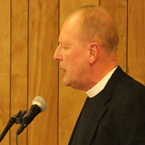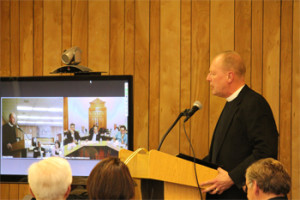Belhar in Context: The Process of Reception in South Africa and North America
March 1, 2014
 On the afternoon of March 20th (while it was evening in South Africa) a two-site symposium took place with half the attendees and presenters at NBTS in New Brunswick, New Jersey, USA, and the other half at the University of Stellenbosch in South Africa. The wonders of today’s technology made this day of conversation possible. The question at hand was: How has the Belhar Confession been received in the differing contexts of the United States and South Africa? Has it been placed on a shelf or has it become a living part of a church’s life?
On the afternoon of March 20th (while it was evening in South Africa) a two-site symposium took place with half the attendees and presenters at NBTS in New Brunswick, New Jersey, USA, and the other half at the University of Stellenbosch in South Africa. The wonders of today’s technology made this day of conversation possible. The question at hand was: How has the Belhar Confession been received in the differing contexts of the United States and South Africa? Has it been placed on a shelf or has it become a living part of a church’s life?
After greetings from representatives of each institution, the conference began with an essay on the reception of the Belhar Confession given by Dr. Allan Janssen giving background on what it means to receive a confession, and how it is that a document becomes not just something a church has, but something it does. This was followed by a paper discussing the reception of the Belhar in South Africa, presented by Dr. Nico Koopman of Stellenbosch. Dr. Koopman spoke of unity for the purpose of reconciliation and for restorative justice. He reflected that although much has been done, especially in organization and administration, much work remains. Dr. Matilde Moros, PCUSA, as respondent for NBTS, reflected that both in post-Apartheid South Africa and post-segregation USA, the issue at hand is classism imposed by the privileged. She suggested that, in order for progress to be made, it would be important to “decolonize” our souls in order to address the sin of separation that has been part of our very lives, and also to address the theological misunderstanding and misuse of the doctrine of election.
 Dr. Daniel Meeter then presented a paper discussing the reception of the Belhar in North America. Dr. Meeter summarized the historical background of the Belhar Confession in the RCA, and also his own journey with the Belhar over a thirty year period. During these decades the Belhar has come to be considered more than a tool for ecumenism. It has become doctrine. One effect of this has been a renewal of interest in the other three confessions of the church. Suspecting that we may have adopted the Belhar out of our desire for unity more than from our recognition of brokenness within ourselves, Dr. Meeter reflected on the work that remains. The Belhar has forced the RCA to look at issues of social justice. In this way, placing the Belhar in our midst is a great gift. Without the living witness of South African theologians, prophetic voices, and faithful friends, this gift would never have been received. As respondent for Stellenbosch, Dr. Robert Vosloo then spoke of the complexity of giving and receiving a gift. He remarked that reception of the Belhar is not something behind us but rather with us and in front of us. In each of our places the challenge is similar. The church faces survival issues, but what we must seek is survival in justice. That will be the fruit of our commitment to what the Belhar embodies.
Dr. Daniel Meeter then presented a paper discussing the reception of the Belhar in North America. Dr. Meeter summarized the historical background of the Belhar Confession in the RCA, and also his own journey with the Belhar over a thirty year period. During these decades the Belhar has come to be considered more than a tool for ecumenism. It has become doctrine. One effect of this has been a renewal of interest in the other three confessions of the church. Suspecting that we may have adopted the Belhar out of our desire for unity more than from our recognition of brokenness within ourselves, Dr. Meeter reflected on the work that remains. The Belhar has forced the RCA to look at issues of social justice. In this way, placing the Belhar in our midst is a great gift. Without the living witness of South African theologians, prophetic voices, and faithful friends, this gift would never have been received. As respondent for Stellenbosch, Dr. Robert Vosloo then spoke of the complexity of giving and receiving a gift. He remarked that reception of the Belhar is not something behind us but rather with us and in front of us. In each of our places the challenge is similar. The church faces survival issues, but what we must seek is survival in justice. That will be the fruit of our commitment to what the Belhar embodies.
Barbara Fillette
Director, Reformed Church Center
